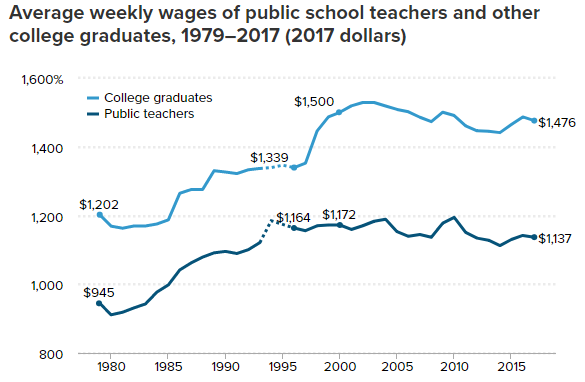People used to get their shoes repaired and the teacher position used to be so much more respected. What if, instead of a decline in the longevity of things and diminished reverence for work positions that bring long term fruit, we would reward deeds and production of goods that have a longer sustainable lifespan of higher quality?
This is a 420 what-if take on the possibility of a society, that would value and award such acts and products the highest.
As kids spend a considerable amount of their time growing up, in kindergartens and schools. Their contact with teachers is as frequent as with their parents. Not always is this something that parents and students think of actively. Perhaps this is not always a thought that goes through the mind of a teacher either. Neither the less, for good or bad, the teachers have a great long term impact on the kids.

Source: Economic Policy Institute, USA
Even though these teachers are practically raising your kids, they are in most cases not appreciated or revered to an equivalent extent. This most certainly has to have an effect on their motivation and enthusiasm.
Teachers and nursing home staff would be better off financially than stockbrokers.
Another sign of this depreciation of that profession is that in most countries, teachers are heavily underpaid compared to other professions that have less long term effects on society and its members.
Now, what if we would show a much more nurturing appreciation and an equivalent monetary reward for these individuals that spend their working careers raising our young. Let not only the teaching profession be subject to that, but all forms of services in a society that bring long term fruit.
How different would society look if there would be a reward system for products and services that display longevity, sustainability, and quality? At the same time depreciating forms of products and services that do the opposite.
Perhaps we would end up with a society with a higher respect for the shoe repair girl and the shoemaker guy. Teachers and nursing home staff would be better off financially than stockbrokers. Foods in stores would be nutritious and healthy. Agriculture and water management would sustainable and conducted responsibly. And maybe most importantly, a group of people that fall well under societies views of revered duties today is the housewives, the stay at home dads and nannies. This group would get a much more elevated status and attention than a weekly caricature TV-series.
The Swedish society might in some regards be a forerunner to these kinds of thoughts as the video below shows.
Looking at it from a more large scale perspective, according to Andrew Miller in his the Trumpet article China’s Hundred-Year Strategy (https://www.thetrumpet.com/14006-chinas-hundred-year-strategy). China is one country that has adopted a 100-year-long term perspective of both their domestic and foreign actions. This might initially be noticeable on the big government level, like in international diplomacy and Chinese domestic energy politics. However looking at it over a 100 year period it will surely trickle into culture, society and eventually the minds of unborn generations.
On a final note, as the world is coming to terms with that most production industries and services are not sustainable and do not hold up in a world of finite resources. Perhaps it is time to have government and grassroots initiatives that award longevity, sustainability, and quality of services and products. Then what form would these rewards have to be if not in the form of financial gains or reverence? A suggestion is something that is long-lived, sustainable and of high quality.
Video: Youtube (2017). World’s First Recycle Mall- ReTuna in Sweden.Available at: https://youtu.be/id9I9o6yxC8 [Accessed 25 Jan. 2019].
Cover picture by Element5 Digital on Unsplash





